Tag: announcements
New Project Release: Marion and Herb Sandler Oral History Project
New Project Release: Marion and Herb Sandler Oral History Project
Herb Sandler and Marion Osher Sandler formed one of the most remarkable partnerships in the histories of American business and philanthropy—and, if their friends and associates would have a say in things, in the living memory of marriage writ large. This oral history project documents the lives of Herb and Marion Sandler through their shared pursuits in raising a family, serving as co-CEOs for the savings and loan Golden West Financial, and establishing a remarkably influential philanthropy in the Sandler Foundation. This project consists of eighteen unique oral history interviews, at the center of which is a 24-hour life history interview with Herb Sandler.
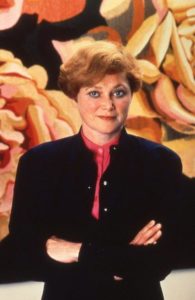
Marion Osher Sandler was born October 17, 1930, in Biddeford, Maine, to Samuel and Leah Osher. She was the youngest of five children; all of her siblings were brothers and all went on to distinguished careers in medicine and business. She attended Wellesley as an undergraduate where she was elected into Phi Beta Kappa. Her first postgraduate job was as an assistant buyer with Bloomingdale’s in Manhattan, but she left in pursuit of more lofty goals. She took a job on Wall Street, in the process becoming only the second woman on Wall Street to hold a non-clerical position. She started with Dominick & Dominick in its executive training program and then moved to Oppenheimer and Company where she worked as a highly respected analyst. While building an impressive career on Wall Street, she earned her MBA at New York University.
Herb Sandler was born on November 16, 1931 in New York City. He was the second of two children and remained very close to his brother, Leonard, throughout his life. He grew up in subsidized housing in Manhattan’s Lower East Side neighborhood of Two Bridges. Both his father and brother were attorneys (and both were judges too), so after graduating from City College, he went for his law degree at Columbia. He practiced law both in private practice and for the Waterfront Commission of New York Harbor where he worked on organized crime cases. While still living with his parents at Knickerbocker Village, he engaged in community development work with the local settlement house network, Two Bridges Neighborhood Council. At Two Bridges he was exposed to the work of Episcopal Bishop Bill Wendt, who inspired his burgeoning commitment to social justice.
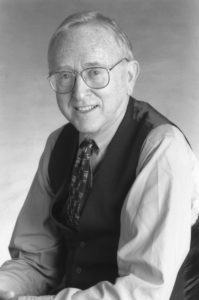
Given their long and successful careers in business, philanthropy, and marriage, Herb and Marion’s story of how they met has taken on somewhat mythic proportions. Many people interviewed for this project tell the story. Even if the facts don’t all align in these stories, one central feature is shared by all: Marion was a force of nature, self-confident, smart, and, in Herb’s words, “sweet, without pretentions.” Herb, however, always thought of himself as unremarkable, just one of the guys. So when he first met Marion, he wasn’t prepared for this special woman to be actually interested in dating him. The courtship happened reasonably quickly despite some personal issues that needed to be addressed (which Herb discusses in his interview) and introducing one another to their respective families (but, as Herb notes, not to seek approval!).
Within a few years of marriage, Marion was bumping up against the glass ceiling on Wall Street, recognizing that she would not be making partner status any time soon. While working as an analyst, however, she learned that great opportunity for profit existed in the savings and loan sector, which was filled with bloat and inefficiency as well as lack of financial sophistication and incompetence among the executives. They decided to find an investment opportunity in California and, with the help of Marion’s brothers (especially Barney Osher), purchased a tiny two-branch thrift in Oakland, California: Golden West Savings and Loan.
Golden West—which later operated under the retail brand of World Savings—grew by leaps and bounds, in part through acquisition of many regional thrifts and in part through astute research leading to organic expansion into new geographic areas. The remarkable history of Golden West is revealed in great detail in many of the interviews in this project, but most particularly in the interviews with Herb Sandler, Steve Daetz, Russ Kettell, and Mike Roster, all of whom worked at the institution. The savings and loan was marked by key attributes during the forty-three years in which it was run by the Sandlers. Perhaps most important among these is the fact that over that period of time the company was profitable all but two years. This is even more remarkable when considering just how volatile banking was in that era, for there were liquidity crises, deregulation schemes, skyrocketing interest rates, financial recessions, housing recessions, and the savings and loan crisis of the 1980s, in which the entire sector was nearly obliterated through risky or foolish decisions made by Congress, regulators, and managements. Through all of this, however, Golden West delivered consistent returns to their investors. Indeed, the average annual growth in earnings per share over 40 years was 19 percent, a figure that made Golden West second only to Warren Buffett’s Berkshire Hathaway, and the second best record in American corporate history.
Golden West is also remembered for making loans to communities that had been subject to racially and economically restrictive redlining practices. Thus, the Sandlers played a role in opening up the dream of home ownership to more Americans. In the offices too, Herb and Marion made a point of opening positions to women, such as branch manager and loan officer, previously held only by men. And, by the mid-1990s, Golden West began appointing more women and people of color to its board of directors, which already was presided over by Marion Sandler, one of the longest-serving female CEOs of a major company in American history. The Sandlers sold Golden West to Wachovia in 2006. The interviews tell the story of the sale, but at least one major reason for the decision was the fact that the Sandlers were spending a greater percentage of their time in philanthropic work.
One of the first real forays by the Sandlers into philanthropic work came in the wake of the passing of Herb’s brother Leonard in 1988. Herb recalls his brother with great respect and fondness and the historical record shows him to be a just and principled attorney and jurist. Leonard was dedicated to human rights, so after his passing, the Sandlers created a fellowship in his honor at Human Rights Watch. After this, the Sandlers giving grew rapidly in their areas of greatest interest: human rights, civil rights, and medical research. They stepped up to become major donors to Human Rights Watch and, after the arrival of Anthony Romero in 2001, to the American Civil Liberties Union.
The Sandlers’ sponsorship of medical research demonstrates their unique, creative, entrepreneurial, and sometimes controversial approach to philanthropic work. With the American Asthma Foundation, which they founded, the goal was to disrupt existing research patterns and to interest scientists beyond the narrow confines of pulmonology to investigate the disease and to produce new basic research about it. Check out the interview with Bill Seaman for more on this initiative. The Program for Breakthrough Biomedical Research at the University of California, San Francisco likewise seeks out highly-qualified researchers who are willing to engage in high-risk research projects. The interview with program director Keith Yamamoto highlights the impacts and the future promise of the research supported by the Sandlers. The Sandler Fellows program at UCSF selects recent graduate school graduates of unusual promise and provides them with a great deal of independence to pursue their own research agenda, rather than serve as assistants in established labs. Joe DeRisi was one of the first Sandler Fellows and, in his interview, he describes the remarkable work he has accomplished while at UCSF as a fellow and, now, as faculty member who heads his own esteemed lab.
The list of projects, programs, and agencies either supported or started by the Sandlers runs too long to list here, but at least two are worth mentioning for these endeavors have produced impacts wide and far: the Center for American Progress and ProPublica. The Center for American Progress had its origins in Herb Sandler’s recognition that there was a need for a liberal policy think tank that could compete in the marketplace of ideas with groups such as the conservative Heritage Foundation and the American Enterprise Institute. The Sandlers researched existing groups and met with many well-connected and highly capable individuals until they forged a partnership with John Podesta, who had served as chief of staff under President Bill Clinton. The Center for American Progress has since grown by leaps and bounds and is now recognized for being just what it set out to be.
The same is also true with ProPublica. The Sandlers had noticed the decline of traditional print journalism in the wake of the internet and lamented what this meant for the state of investigative journalism, which typically requires a meaningful investment of time and money. After spending much time doing due diligence—another Sandler hallmark—and meeting with key players, including Paul Steiger of the Wall Street Journal, they took the leap and established a not-for-profit investigative journalism outfit, which they named ProPublica. ProPublica not only has won several Pulitzer Prizes, it has played a critical role in supporting our democratic institutions by holding leaders accountable to the public. Moreover, the Sandler Foundation is now a minority sponsor of the work of ProPublica, meaning that others have recognized the value of this organization and stepped forward to ensure its continued success. Herb Sandler’s interview as well as several other interviews describe many of the other initiatives created and/or supported by the foundation, including: the Center for Responsible Lending, Oceana, Center on Budget and Policy Priorities, Learning Policy Institute, and more.
Herb and Marion Sandler also played key roles in the formation and funding of two important research centers here on the UC Berkeley campus which have a global reach: the Berkeley Center for Equitable Growth (CEG) and the Human Rights Center. The CEG is directed by economist Emmanual Saez and has supported the influential work of Thomas Piketty which looks at methods for reducing wealth and income disparities around the globe. The Human Rights Center has for the past 25 years investigated and shed light upon human rights abuses around the globe.
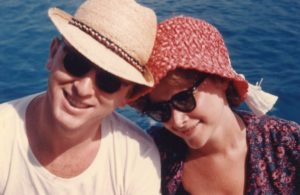
A few interviewees shared the idea that when it comes to Herb and Marion Sandler there are actually three people involved: Marion Sandler, Herb Sandler, and “Herb and Marion.” The later creation is a kind of mind-meld between the two which was capable of expressing opinions, making decisions, and forging a united front in the ambitious projects that they accomplished. I think this makes great sense because I find it difficult to fathom that two individuals alone could do what they did. Because Marion Sandler passed away in 2012, I was not able to interview her, but I am confident in my belief that a very large part of her survives in Herb’s love of “Herb and Marion,” which he summons when it is time to make important decisions. And let us not forget that in the midst of all of this work they raised two accomplished children, each of whom make important contributions to the foundation and beyond. Moreover, the Sandlers have developed many meaningful friendships (see the interviews with Tom Laqueur and Ronnie Caplane), some of which have spanned the decades.
The eighteen interviews of the Herb and Marion Sandler oral history project, then, are several projects in one. It is a personal, life history of a remarkable woman and her mate and life partner; it is a substantive history of banking and of the fate of the savings and loan institution in the United States; and it is an examination of the current world of high-stakes philanthropy in our country at a time when the desire to do good has never been more needed and the importance of doing that job skillfully never more necessary.
Martin Meeker, Charles B. Faulhaber Director, Oral History Center, UC Berkeley
List of Interviews of the Marion and Herbert Sandler Oral History Project
Ronnie Caplane, “Ronnie Caplane: On Friendship with Marion and Herb.”
Joseph DeRisi, “Joe DeRisi: From Sandler Fellow to UCSF Professor of Biochemistry.”
Stephen Hauser, “Stephen Hauser: Establishing the Sandler Neurosciences Center at UCSF.”
Russell Kettell, “Russ Kettell: A Career with Golden West Financial.”
Thomas Laqueur, “Tom Laqueur: On the Meaning of Friendship.”
Bernard Osher, “Barney Osher: On Marion Osher Sandler.”
Michael Roster, “Michael Roster: Attorney and Golden West Financial General Counsel.”
Kenneth Roth, “Kenneth Roth: Human Rights Watch and Achieving Global Impact.”
Herbert Sandler, “Herbert Sandler: A Life with Marion Osher Sandler in Business and Philanthropy.”
James Sandler, “Jim Sandler: Commitment to the Environment in the Sandler Foundation.”
Susan Sandler, “Susan Sandler: The Sandler Family and Philanthropy.”
William Seaman, “Bill Seaman: The American Asthma Foundation.”
Paul Steiger, “Paul Steiger: Business Reporting and the Creation of ProPublica.”
Richard Tofel, “Richard Tofel: The Creation and Expansion of ProPublica.”
NHPRC Supports Processing Environmental Collections at The Bancroft Library
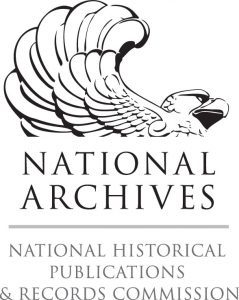
The Bancroft Library is currently engaged in a two-year project funded by the National Historical Publications and Records Commission to process a range of archival collections relating to environmental movements in the West. A leading repository in documenting U.S. environmental movements, The Bancroft Library is home to the records of many significant environmental organizations and the papers of a range of environmental activists.
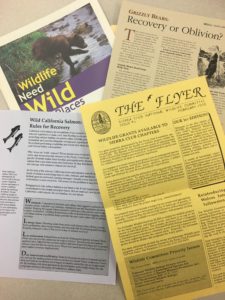
Among the library’s environmental holdings are the records of the Sierra Club, including correspondence of naturalist and Club founder John Muir, the records of the Save-the-Redwoods League, and the records of Save the Bay. Among the collections already made available to researchers in this current NHPRC-funded project are the records of the Coalition for Alternatives to Pesticides, the records of the Small Wilderness Area Preservation group, the papers of environmental lawyer Thomas J. Graff, and the records of California-based Trustees for Conservation. Collections scheduled to be processed in the next eighteen months include the records of such major environmental organizations as Friends of the River, Friends of the Earth, the Rainforest Action Network, and the Earth Island Institute.
No librarians Nov 6-9
What! Yes, it’s true. The Public Health librarians will *all* be gone from Nov 6-9. We apologize for any interruptions to your work that this might cause. Please plan ahead for any literature requests that you anticipate needing.
Our document delivery department, however, will be open and processing your article and books requests during this time.
The Public Health Library will be closed on November 10 to observe Veterans Day.
Our usual services will resume Monday, November 13.
A Night With Voice of Witness: August 16 @ 6pm in the MLK Student Union at UC Berkeley
This Tuesday—August 16, 2016—please join us along with Voice of Witness for an evening of oral history and human rights. OHC interviewer, Shanna Farrell, will moderate a lively discussion between Voice of Witness editors, Peter Orner (Underground America: Narratives of Undocumented Lives) and Robin Levi (Inside this Place, Not of it: Narratives from Women’s Prisons) on the intersections of oral history methods, access, and social justice.
The event will begin at 6pm in the MLK Student Union’s Tilden Room (5th Floor). Light refreshments will be served and Voice of Witness books will be available for purchase.
This event is sponsored by OHC’s Advanced Oral History Summer Institute, which brings together students, faculty and scholars from across the United States for an intensive week of study and discussion. For more details, see the Oral History Center website.
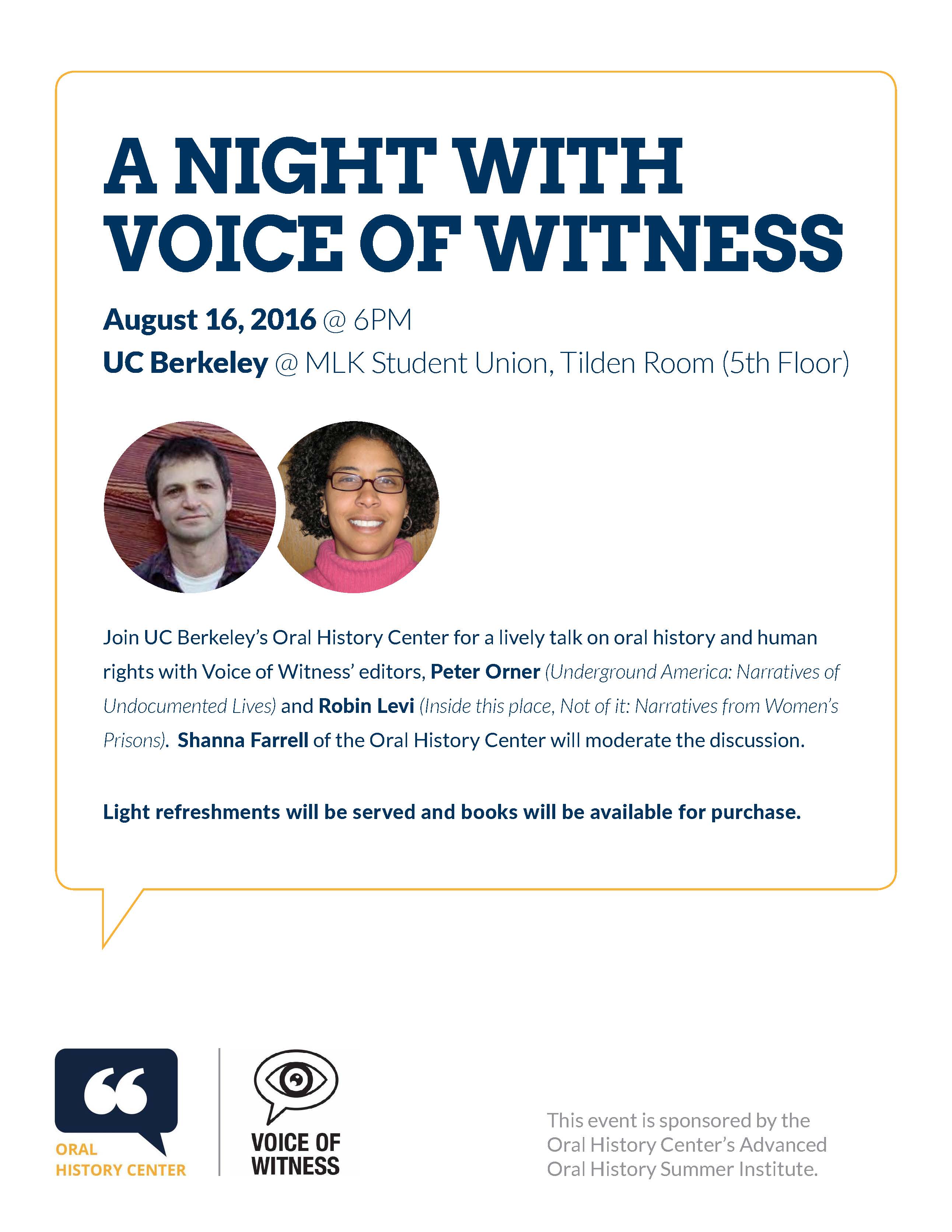
American Chemical Society resources not available via Proxy
UPDATE: Access issue resolved.
CHANT Database unavailable on December 4 -6, 2015 due to maintenance
Due to the network maintenance of the CHANT Database, the Database will be suspended from 6:00pm HKT 4 December (2:00am PST December 4, 2015) to 9:00am HKT 7 December, 2015 (5:00:00 PST December 6, 2015). We apologize for any inconvenience.
Access problem for all journals on JAMA network
We appear to have lost online access to all journals on the JAMA network. Please email eproblem@library.berkeley.edu using your berkeley.edu email account and provide the citation. The pdf file will be emailed to you as soon as possible.
Sorry for the inconvenience that this may caused.
UPDATE: Access issue resolved.
ScienceDirect to cease support of Internet Explorer 8 on January 1, 2016
Announcement from Elsevier – Science Direct
Why are we ceasing support of IE8?
We are following Microsoft?s directive to focus our support on newer, officially-supported IE browser versions. Microsoft announced in 2014 that, as of January 2016, it would only support the most recent IE browser version with technical support and security updates. We strongly encourage our customers to follow Microsoft?s directive as well by updating to more recent versions of IE. Additionally, users can move to the latest versions of the Chrome or Firefox browsers for an optimal ScienceDirect experience.
By removing IE8 from our support list, we will be able to provide the following future enhancements:
Remove current IE8 security issues
Enhance existing security measures across all browsers
Add support for new browser technologies
Add responsive design to aid use of ScienceDirect across devices
Improve accessibility to better enable access to people with diverse abilities
If you have any questions or concerns, please visit the ScienceDirect Blog for more details or contact us:
usinfo@elsevier.com – US & Canada
nlinfo@elsevier.com – Europe
sginfo@elsevier.com – Asia, Australia & New Zealand
brinfo@elsevier.com – Mexico, Central & South America
Best regards,
The ScienceDirect Team
Note: Compatibility mode in IE9 or higher reverts the browser back to IE7 or IE8 behavior. If you experience issues accessing ScienceDirect using IE9 or higher, please disable the compatibility view mode in your IE browser.
ProQuest Dissertations & Theses site blocked
ProQuest Dissertations & Theses is being blocked for suspicious downloads. UCB users will not be able to access the Preview PDFs (the first 24 pages of a dissertation) or the Full text PDFs while this is being investigated.
UPDATE: The block has been lifted.
Remote Access to CRC Netbase journals
We have access problems via Proxy server for a number of CRC NetBase journals. Please try accessing these journals via VPN or via a campus PC while our Licensing librarian work with the publisher and CDL to resolve the issue.
UPDATE: As of 7/16/13, 1:00pm, access problem for CRC NetBase journals via the proxy server have been resolved.